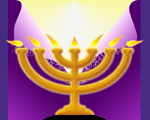
Do not think that I have come to abolish the
Torah (Law) or the Prophets; I have come not to abolish, but to
fulfill. For truly I tell you, until heaven and earth pass away, not
one letter or one dot will pass from the Torah until all is
accomplished. Therefore, whoever violates one of the least of these
commandments and teaches others to do the same will be called least in
the Kingdom of Heaven; but however does them and teaches them will be
called great in the Kingdom of Heaven.
Matityahu (Matthew) 5:17-19
The Holy Disciples of Yehoshua Foundation exists to promote the teachings of Yehoshua of Nazarit, the Messiah of what is commonly called "the New Testament." (It is actually the Kitvei haShlichim--the Writings of the Emissaries, but we often use the conventional moniker for clarity.) We endeavor to live his teachings comprehensively--in our conduct, our word and our thought, in private and in public-and to encourage others to do likewise. We accept him as our consummate Rabbi and, as his name indicates, the holy one through whom we are ultimately saved by our Father in heaven.
Yehoshua and his disciples taught from the Tanakh (commonly and mistakenly called "the Old Testament"). That was their Bible, and it remained solely so well after his execution, and well before the Kitvei haShlichim emerged. Its instructions were the foundation of their beliefs and their lifestyle and of all those who walk in their footsteps. We accept what the Tanakh says about morality, about worship, about business, about charity, about diet and hygiene-about all aspects of our lives.
Along with the Tanakh's essential and enduring foundation, the New Testament provides the indispensable window into what Yehoshua and his disciples taught. When it says congregational leaders must meet specific criteria, we implement that. When it says a husband and wife are bound to one another until death, we accept that. What it says about major issues such as gender roles or apparently lesser ones such as clean speech or the continuance of particular oral instructions, we accept.
To accept the Bible as representing God's specific instructions and to voluntarily and determinedly exchange our will for his will is the holy discipline of Yehoshua. To do so out of unselfish love for God and for other people is the mark of the holy spirit.

